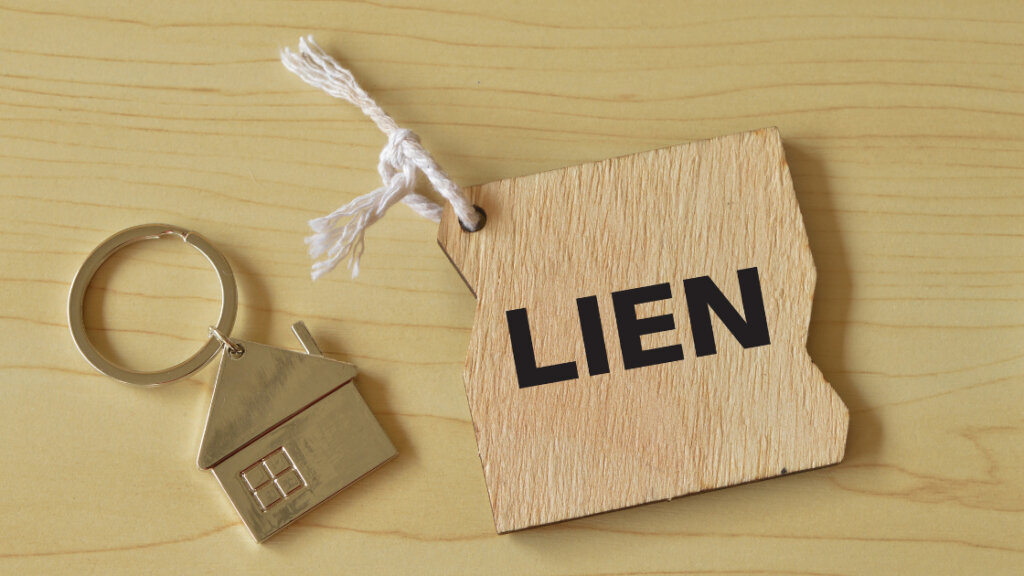
Selling your home can be tricky, particularly when there are liens on your property. A lien is a legal claim that someone has against your property because of an unpaid debt or obligation. It can be placed on your home by a creditor, a government agency, or even a contractor you hired to do work on your property.
In this blog, we’ll walk you through everything you need to know about property liens and how they can impact the process of selling a house. We’ll explain what exactly a lien is, what types of liens exist, and how they can affect the sale of your home. We’ll also provide guidance on how to deal with liens and examples of different types of liens that homeowners may encounter. Knowing how to prevent liens from occurring in the first place is also important, so we’ll share some tips on that, too. Whether you’re selling a house for the first time or have done it before, it’s critical to understand the impact of liens on your property and how to handle them during the selling process.
What is a lien on a house?

Liens are formal claims against a piece of property that act as security for debts and obligations that haven’t been paid. Creditors, contractors, or government bodies like the IRS can put them up if you haven’t paid your taxes or child support. Liens must be taken care of before a house can be sold. This means that any remaining liens must be paid off with the money from the sale. Homeowners should do an up-front title check to avoid problems when they sell their homes and work closely with their real estate agent, title company, and lender to make sure they have a clear title. The best way to deal with liens is to talk to an expert real estate lawyer who knows about the different kinds of liens and when they expire.
Types of liens( Voluntary liens, Involuntary liens)
If you’re looking to sell your house, it’s important to understand the different types of liens that can affect the sale. There are two main types – voluntary and involuntary. Voluntary liens are created intentionally, such as taking out a mortgage or home equity loan. Involuntary liens, on the other hand, can happen without your agreement. Examples include tax liens, construction or mechanics’ liens, and judgment liens from lawsuits.
To avoid any issues when selling, it’s best to clear all outstanding debts and unpaid taxes or fees that might have resulted in liens on your property. Skipping this step can lead to legal problems from creditors or government agencies. Fortunately, title search companies can help by thoroughly checking public records to ensure all outstanding claims have been resolved before closing the sale.
Examples of liens
Did you know that when selling or buying a property, there are different types of liens that could come up? These can include tax liens, mortgage liens, and judgment liens. It’s super important to do a lien search beforehand to make sure there are no lingering debts that could impact the sale. If there are any outstanding liens, don’t fret – you can work with the creditor to pay them off or set up a repayment plan. And no need to navigate this process alone – a real estate agent or attorney can help guide you through it and make sure your title is nice and clear.
How liens affect the sale of a house

Selling a house with a lien can create quite a bump in the road. With various types, it’s crucial to address and resolve them before you seal the deal for a smooth closing. To avoid unexpected costs, homeowners should always double-check for any liens prior to putting their home on the market. Don’t go it alone – it’s a smart move to seek help from seasoned pros like real estate agents, attorneys, or title companies. Their expertise can help navigate the tricky intricacies, ensuring a thorough title search that clears any lingering issues. In the end, this allows a qualified buyer to comfortably purchase your property with ample equity.
Can you sell a house with a lien?
Selling a property with a lien might be tricky, but it’s definitely doable. To achieve this, you’ll need to settle the lien either by negotiating with the lienholder or by allocating proceeds from the sale. Transparency is key, so make sure you inform potential buyers about any liens and don’t be afraid to seek professional advice for the best course of action. To steer clear of liens in the first place, just remember to pay your bills promptly, double-check contractor credentials, and stay up to date with your tax responsibilities.

How liens impact closing
Outstanding liens on a house can make selling a house difficult. Before selling your home, you need to consider different types of liens that might impact your ability to sell your home. You need to ensure that all the liens are resolved before you put your house on sale, including property tax liens, mechanic’s liens, and judgment liens filed by creditors, government agencies, or contractors. Liens can significantly affect closing costs and delay them too. It is always best to work with a real estate agent or attorney who can guide you through the process.
When do liens need to be paid?
Before putting your property on the market, it’s essential to settle any liens, as they can create hurdles when selling. With diverse payment obligations for different types of liens, identifying and addressing them early on can pave the way for a smooth closing. Enlisting the help of real estate attorneys or title companies can provide the guidance you need in resolving these matters efficiently.
How to deal with liens when selling a house

Navigating through liens while selling a home calls for careful planning. Firstly, getting a good grasp on what a property lien is and its implications on the sale is essential. Before listing, make sure to identify any existing liens, and team up with a real estate attorney to tackle any outstanding dues head-on. Proactively negotiating with creditors might lead to reduced or released liens in return for prompt payment. Finally, maintaining transparency about any disclosed liens not only fosters trust between you and potential buyers but also ensures proper documentation of lien resolution.
Steps to resolve a lien
To eliminate a legal claim against your property when preparing for a home sale or refinancing, you must first identify any existing liens using a title search or public record. Then, work with a real estate attorney to negotiate with lien holders and either repay the debt or establish a payment plan. It’s crucial to obtain a release of lien document from creditors once you have paid off debts fully. Collaborating with qualified buyers and lenders helps ensure that all liens are appropriately cleared before closing costs are upfront.
Negotiating with lien holders
Proper negotiation is crucial while dealing with lien holders. Understanding their priorities and having good negotiation skills can help create an effective plan to satisfy all liens before closing the home sale. This process helps avoid any legal issues down the line and provides clear title ownership to the new buyer. Negotiating a lower payoff amount for older liens is possible. So, it’s always advisable to start negotiations upfront with creditors like mortgage lenders or tax agencies to prevent different types of liens from arising.
Paying off the lien
Clearing a lien on your property might involve negotiating with creditors or seeking legal help. It’s vital to check for any liens before listing your home to avoid surprises. Tackling outstanding liens upfront paves the way for a hassle-free selling process. You may need payment plans and legal support to resolve more complex liens. Once the debt is settled, make sure to obtain a release of lien document from the creditor. To guarantee all liens are meticulously managed during the sale, collaborate with a skilled real estate attorney or agent.
Examples of liens on a house

When it comes to buying or selling a home, understanding the impact of property liens is crucial. Be mindful of various lien types, like tax liens or mechanic’s liens, as they can influence sale proceeds and repayment options. Teaming up with a qualified real estate attorney or title company helps clear outstanding liens and guarantees a clean title. Remember, certain liens, such as general judgment lien or child support, might demand an upfront payment or a structured plan. As a property owner or borrower seeking to leverage home equity for renovations or construction lien repayment, always ensure there’s enough equity in your property.
Mortgage liens
Selling a home with a mortgage lien can indeed be complex. To avoid complications, it’s essential to address the lien before listing your home. As one of the most common lien types faced by homeowners, mortgage liens can hinder the sale process if the owner’s debt exceeds the property’s value. To guarantee a seamless transaction without legal consequences, homeowners must resolve any outstanding liens. Keep in mind that a qualified buyer is unlikely to purchase a property burdened by outstanding debts unless there’s sufficient equity to serve as collateral.
Property tax liens
Clearing all outstanding property taxes is a vital step before selling a home. Unresolved property tax liens could result in government foreclosure, causing hiccups during the closing process. Homeowners should address these liens early on to avoid delays or snags in the sale. For peace of mind, consider consulting a real estate attorney or title company, as their expertise and thorough lien searches can help uncover hidden issues. By taking these proactive measures, homeowners can confidently sell their homes without any lingering concerns.
Judgment liens
Judgment liens, a common obstacle in the home selling journey, typically result from unpaid debts or legal claims against homeowners, with creditors, contractors, and government agencies often filing them. They can impede property sales by hindering ownership transfer until the debt is fully settled. However, debtors do have the option to negotiate with creditors and establish payment plans to repay the outstanding amount, ultimately removing those liens. Before listing your home for sale, ensure you conduct a thorough search for any existing judgments related to collateral.
How to prevent liens on your house
To avoid liens on your property, it’s vital to grasp what they entail and how they can affect a home sale. When buying or selling, engage a title company or real estate attorney for a comprehensive title search, making sure there are no outstanding liens. Additionally, stay on track with mortgage payments and other financial obligations, settle property taxes promptly, and circumvent contractor disputes.
By proactively following these steps, you can shield yourself from potential legal troubles arising from unpaid debts or liens against your property. Ensure you have adequate equity in your home before undertaking significant renovations or using your home as collateral for borrowing. Keep in mind that as a borrower, you’re responsible for clearing all liens before completing the sale.
Pay property taxes on time
For a seamless home sale and clean title, it’s essential for homeowners to tackle any outstanding liens on their property. Property tax liens, for instance, can hinder the sale process. Paying off taxes upfront and in full is the most effective way to dodge such a lien. Neglecting this type of lien can result in foreclosure or legal action by government agencies like the IRS. To steer clear of these repercussions, consult a real estate agent or attorney for guidance on settling any unpaid debts or liens before moving forward with the sale.
Keep up with mortgage payments

To avoid encountering liens on your property during the home-selling process, it’s crucial to prioritize timely and full payments for all your financial obligations. Falling behind on mortgage payments or other debts can lead to a creditor or even a government agency, such as the IRS or local government, placing a lien on your property. These liens can arise from unpaid child support or back taxes, among other reasons. It’s always advisable to stay current with your mortgage payments to prevent such issues. If you face difficulties in meeting payment obligations, consider reaching out to your lender for assistance or exploring refinancing options. Remember, addressing any potential liens at an early stage is the best course of action.
Avoid contractor disputes
To avoid contractor disputes that can lead to liens on your property, it is essential to take precautionary measures. Start by hiring reputable contractors with excellent referrals and clear payment agreements. Consider incorporating a lien waiver clause into the contract, which prevents the contractor from filing a lien against your property. It’s also advisable to regularly check property records to promptly identify any potential liens. By taking these proactive steps, you can prevent unnecessary legal actions that could jeopardize the sale of your home or your renovation plans.
What to do if you discover a lien on your property

Discovering a lien on your property during the home sale process can be daunting, but there’s no need to panic. Take a step back and gather information about the type of lien and its potential impact on the sale. Begin by conducting a title search or consulting a title company to uncover any existing liens on your property. Once you’ve identified the lien, determine if it’s voluntary or involuntary and consider seeking legal advice if needed. Real estate agents or lenders can also provide valuable guidance on handling various types of liens, such as tax liens, judgment liens, or mechanic’s liens. Remember, staying informed and seeking professional assistance can help navigate the situation smoothly.
Contact the lien holder
When confronted with a lien on their property during the sale, homeowners should take immediate action by contacting the lien holder. It’s important to verify the validity of the lien and, if necessary, seek legal advice. Ignoring the lien can lead to serious consequences, including legal action or even foreclosure. Before buying or selling a property, conducting a title search is highly recommended to uncover any potential surprises during the closing process. Consulting with a skilled real estate attorney will provide the guidance and support needed to successfully navigate the process of removing the lien from the property.
Verify the lien is valid
When confronted with property liens that can affect home sales, it’s essential to conduct due diligence and verify the validity of the liens. One effective way to do this is to obtain a copy of the lien from the creditor and carefully review it for accuracy. In the case of inaccurate liens, homeowners have the option to dispute them either by working directly with the creditors or by seeking legal recourse. However, if the liens are valid, homeowners must prioritize resolving their debts with the creditors before proceeding with the sale. This may involve negotiating a payment plan or settling the debts in full. Through thorough verification and resolution of liens upfront, homeowners can ensure clear titles and attract qualified buyers, resulting in a smooth and successful home sale.
Seek legal advice if necessary
To navigate any potential complications arising from liens on your property during the home selling process, it’s crucial to be proactive and engage the expertise of a real estate attorney. Seeking legal advice will provide you with the necessary guidance to understand your options for resolving the issue while protecting your rights as a homeowner. Begin by verifying the validity of any liens by obtaining copies from creditors or conducting a thorough search of public records. If the liens are confirmed to be valid, an attorney can assist in negotiating repayment plans or reaching settlements with lenders, creditors, or government agencies involved. Remember, ignoring these liens can lead to foreclosure or legal action, so it’s always best to consult with an experienced attorney to address and resolve any potential issues smoothly and efficiently.
Importance of being aware of liens on your property
Sellers must be well-informed about property liens as they have the potential to impact every aspect of a home sale. It is crucial to thoroughly investigate and address potential property liens, including mortgage liens, judgment liens, and property tax liens, before listing your house for sale. This can be achieved through conducting a comprehensive title search or consulting a real estate attorney. Overlooking this crucial step could lead to complications later in the selling process. Failure to disclose outstanding liens can result in legal action, foreclosure, or loss of proceeds from the sale. By being transparent about any outstanding debts and taking proactive measures to repay them prior to listing your house, you can ensure a smooth transaction with qualified buyers who expect a clear title and no surprises at closing.
Conclusion
Lien on your house is a creditor’s legal claim against the property for unpaid debts? It can prevent you from selling your house until the debt is cleared. To avoid complications, check for any existing liens before selling. Different types of liens exist, such as mechanic’s liens or IRS tax liens. You may need to pay off the debt or negotiate with the lien holder to remove the lien. Keep in mind that liens are public record and can impact potential home buyers’ confidence. Address any liens before listing your home to ensure a smooth sale. Stay proactive and clear any outstanding issues before selling your house.

Contact Us
We would love to hear from you! Please fill out this form and we will get in touch with you shortly.

